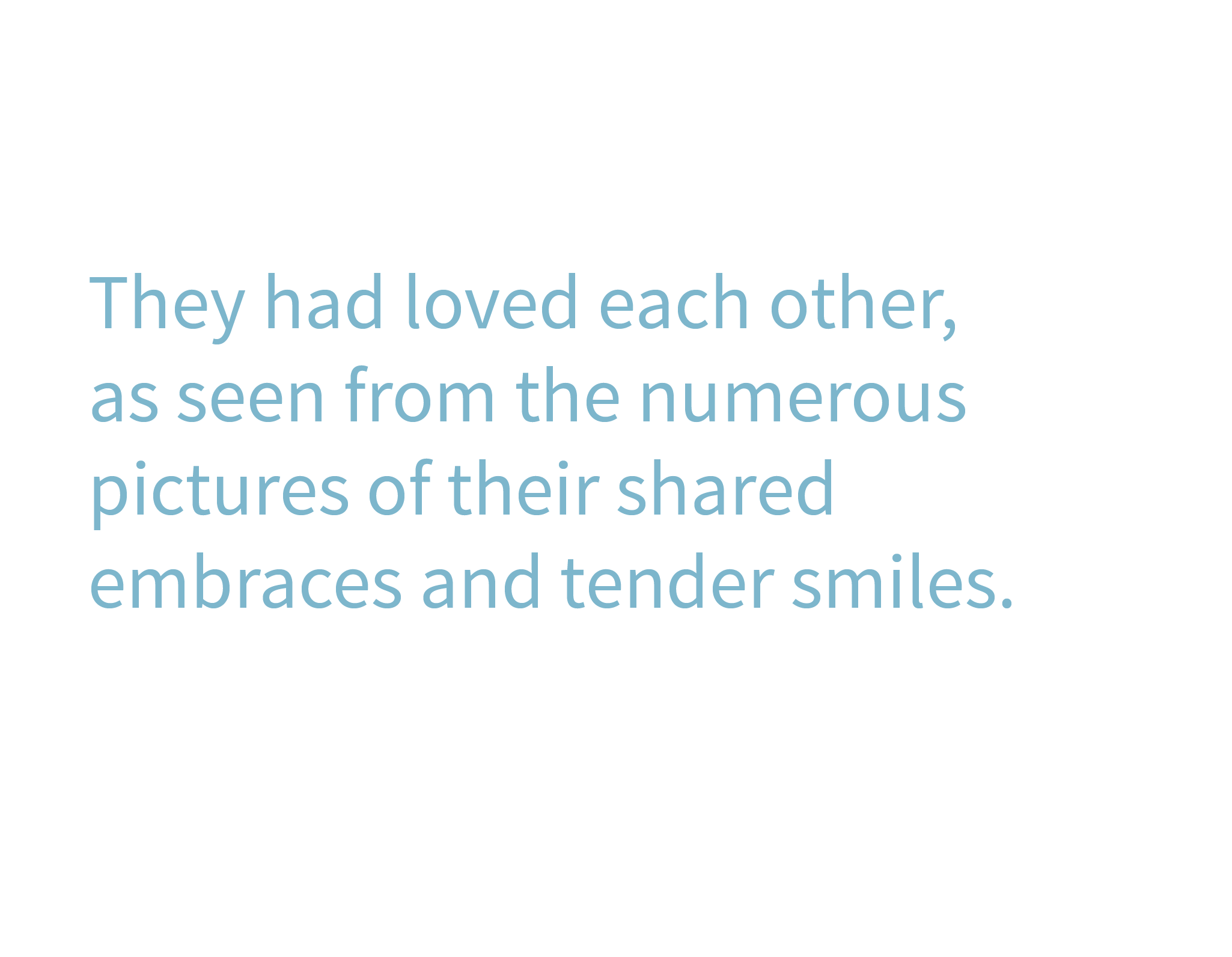They had loved each other, as seen from the numerous pictures of their shared embraces and tender smiles. He had been a handsome man, lean, with dark hair, eyes exuding an air of confidence. She had a rosy complexion, locks of dirty blonde hair framing her face and a brazen smile. They had gotten married young, in a surge of youthful passion. Those times were not theirs anymore.
It happened gradually: television images of unburied bodies that had sighed their last breath without a hand to hold, of people in hospitals uncontrollably coughing. They had turned the television screen off and in this insupportable void, slowly, crowds began to fall apart, one eyeing the other with suspicion. They had all become sick with silence, reduced to monosyllabic whimpers, tethered by memories of better times.
It was the silence that made a part of each and every one of them leave. And slowly, confined in their fear, there was no more place for the spontaneity they had once known.
She would wearily watch him fall asleep next to her, his chest slightly heaving as he breathed, his lips parted, almost reminding herself of how years before, they had spent breathless nights alternating lethargy with outbursts of passion. Then things would get calm, they would detach. And, after having rolled over on his side, he’d fall asleep, unattainable.
· · ·
“Perhaps we could go somewhere, for a little while.”
They took the first train, away. They watched landscapes dismembered by fall pass before their eyes as they quietly sat amid the empty seats.
They walked for hours, aimlessly, wandering on paths she had once known as a child, an autumnal perfume permeating the fresh air.
A beaten sign that said welcome appeared at the end of the road, dangling on the front of a small wooden cabin, lost in the midst of bare-branched trees and vestiges of summer leaves.
They had wanted to feel welcomed. The city streets had become so empty, only the dull voice of people smoking their last cigarettes on balconies creating a semblance of a mysterious, ghostly presence.
They had bought oranges a few kilometers before, packed in a brown paper bag, slightly stained with the juice of a crushed orange: “It’ll be a dollar twenty”, “Where are these oranges from?”, “down south”. The farmer spoke with a tranquility and friendliness that had become foreign to them.
They peeled an orange, and then bit into it, sticky juice trickling onto their fingers, the colors of an orange orchard seeping into their minds with every bite. They laughed like children.
They had walked towards the wooden cabin, a light coming out of a window indicating some form of presence. They opened the door with a pleasant chime.
Two men, their faces marked by age, sat, drinking, laughing.
“Oh, you should’ve seen Marie’s face when she said that,” said one of them, laughing, undisturbed by their unexpected presence.
One man made a gesture to them, signaling them to come closer. He poured them two warm drinks, with a welcoming, tacit smile.
Her husband took a sip, staring at the view from the window. She had watched his gaze break, decompose under her eyes, with an innocent, light-headed smile that reminded her of that of a young lover, the cup of mulled wine warming his hands.
“If you walk that way for ten minutes,” said the man, suddenly, vaguely pointing to their left, “there’s the sea.”
They made their way out. As they walked through the forest, bathed in the pinkish glow of the evening, him holding her hand as they used to, there suddenly was a clearing- a horizonless sea with small waves playfully licking the sand was visible from afar. They took their shoes off, impatient to feel the sand … around their toes, uncontrollably laughing, running to the shore.
They ran into the water, their ankles sinking into the sand and their wet pants sticking to their calves, waves gently lapping at their legs. The sky above them seemed to glow, the few clouds above them fainting onto the horizon, heavy with languor in the pale glow of eventide.
He looked at her, his dark eyes twinkling with life.
“I wish we were here forever,” he said, taking her into his arms with a smile, their cheeks burning, as if a spell had been broken.
They then kissed with a passion and urgency unlike anything they had known before, holding each other, their slender bodies shaking, sighing in relief, perhaps as in a dream.
Margaux Emmanuel is a seventeen-year-old French-American writer living in Japan. She is a senior at the International French School in Tokyo, and will be attending Cambridge University to study English literature this autumn. She is also a book-blogger (The Young Reader’s Review) and amateur kickboxer.

